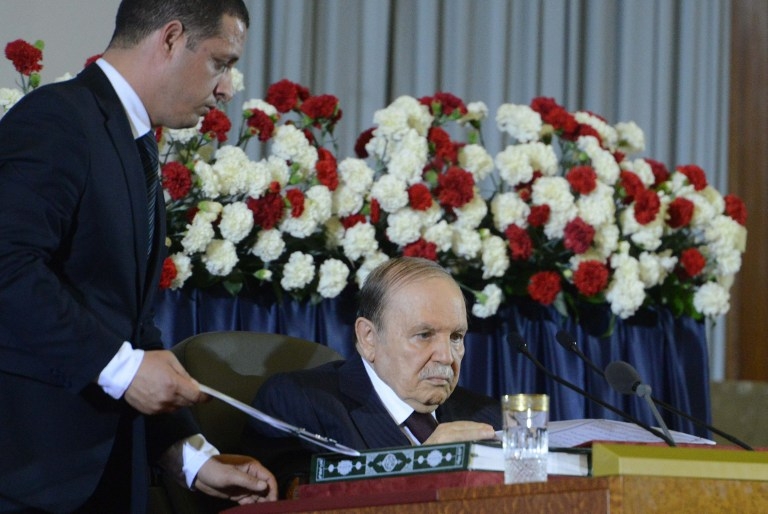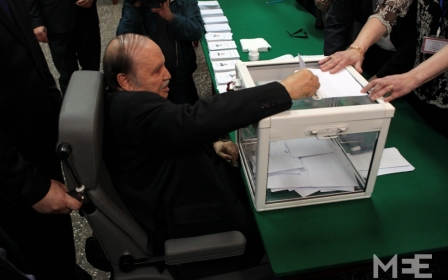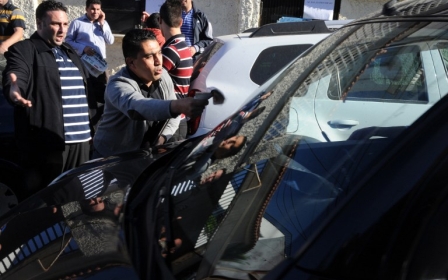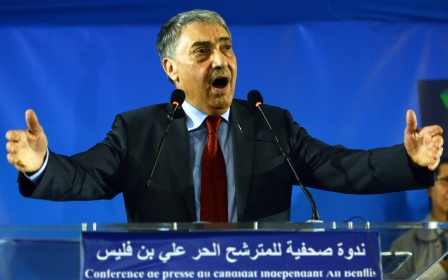Algeria's Bouteflika names first cabinet of 4th term

Algerian President Abdelaziz Bouteflika on Monday named the first cabinet of his fourth term in office, without managing to win over opposition figures as his reappointed prime minister had hoped.
The announcement of Algeria's new government comes a week after the 77-year-old Bouteflika was sworn in after his landslide re-election in April despite his poor health preventing him from campaigning and with five opposition parties urging a boycott.
The 34-member cabinet, dominated by technocrats, sees most key senior ministers holding onto their posts, including Prime Minister Abdelmalek Sellal, who had stepped down in February to run Bouteflika's election campaign.
The key portfolios being retained are Ramtane Lamamra (foreign affairs), Yayeb Belaiz (interior), Tayb Louh (justice), Youcef Yousfi (energy) and General Ahmed Gaid-Salah as deputy defence minister.
"The key positions are still held by the presidential clan," said political analyst Rachid Tlemcani.
Stay informed with MEE's newsletters
Sign up to get the latest alerts, insights and analysis, starting with Turkey Unpacked
Karim Djoudi, who has headed the finance ministry since 2007, is stepping down for health reasons, according to informed sources, and will be replaced by Mohamed Djellab, who worked under him in the outgoing cabinet.
Another figure leaving the cabinet is culture minister Khalida Toumi, a former opposition member and leading Algerian feminist who eventually rallied behind Bouteflika, joining his government in 2002.
She will be succeeded by Nadia Labidi, a professor at Algiers university and one of seven women in the new cabinet, with Nouria Benghebrit, another university teacher, heading the education ministry.
The government is tasked with implementing the president's political programme, under the constitution which was amended in 2008 to remove the two-term limit barring Bouteflika from re-election.
The ailing leader has appeared in public very rarely, and always in a wheelchair, since suffering a stroke last year.
Opposition spurns offer
Bouteflika vowed in his campaign, conducted on his behalf by a team of allies, to pursue constitutional reform during his fourth term in office, strengthening the separation of powers and the independence of the judiciary.
He also pledged to promote the rights of the opposition, which plays a very minor role in Algerian politics.
But the opposition parties spurned an offer by Sellal to take part in a coalition government.
The Socialist Forces Front was the first to turn down the invitation, with its leadership saying the veteran opposition party had rejected two ministerial posts, preferring to dedicate itself to "building a national consensus" and preparing for an all-party conference.
The Worker's Party, led by Louisa Hanoune, the only female candidate in the presidential race, also refused to join the government.
Political observers said the move was largely expected.
"The powers that be have shown their arrogance towards the opposition and social movements," said Tlemcani, describing the cabinet re-shuffle as a "non-event."
Rachid Grim, another analyst, said the only political significance of the new government line-up was that "we are continuing on the same path."
Bouteflika remains popular with many Algerians who credit him with helping to end the devastating civil war in the 1990s, with his campaign team highlighting the stability achieved during his 15 years in power.
But others have clamoured for change, including the protest movement Barakat ("Enough") formed to oppose his re-election, amid anger at the government's failure to improve the lives of ordinary Algerians despite the North African country's vast natural wealth.
Middle East Eye delivers independent and unrivalled coverage and analysis of the Middle East, North Africa and beyond. To learn more about republishing this content and the associated fees, please fill out this form. More about MEE can be found here.




